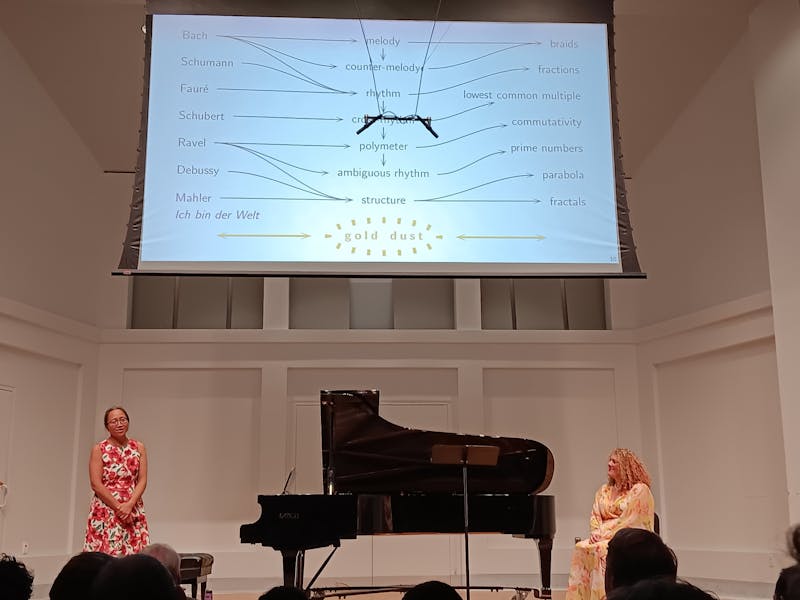
Dr. Eugenia Cheng is on a mission to change the perception of math, to make it fun and exciting.
Cheng was the guest speaker at the second-annual Celebration of Math and Music, an event hosted by the partnership between the Jacobs School of Music and the math department in the College of Arts and Sciences. The event took place at 7 p.m. Feb. 20 at the Ford-Crawford Hall of the Simon Music Center.
While at the event, Cheng argued that math had emotion and was not as cut and dry as many people may perceive it to be.
“Sometimes people say to me, ‘Ah, yes, math and music are both very related, aren’t they? They both involve counting,’” Cheng said. “That’s the most boring aspect of math and the most boring aspect of music put together!”
Cheng went on to argue that mathematics is a much more personal area of study than many people would believe. She said math is not just about studying formulas and taking tests.
“It’s about making connections between different ideas,” Cheng said. “If we associated more feelings with math in mainstream math education then we would stop putting quite so many people off, who get put off because they think that math is devoid of feeling, devoid of creativity and devoid of any personal influence.”
Attendees learned through engaging talks and hands-on activities.
Cheng is the scientist in residence at the School of the Art Institute in Chicago. She has written several books about mathematics and founded the Liederstube, a center for musicians located in Chicago. At the event, her passion for both math and music shone through, as she described the mathematical difference between different rhythms. Cheng demonstrated this by switching from a professor to a passionate pianist as she bounced between concepts, even playing a few bars of songs off the top of her head to demonstrate her points.
IU mathematics professor Kevin Pilgrim organized the first event over a year ago. He said he had the idea due to Math Awareness Month, which the math department acknowledged but lacked any public events to commemorate it. Pilgrim was unsure how to organize the event until he talked with professor Julian Hook. Hook had recently published a book comparing music and math, which gave him the perfect lecture material. He ended up becoming the guest speaker for the first event.
“Music theorists study chord progressions, you can sort of imagine musical chords forming a sort of space in which you can move around in a piece of music,” Hook said. “It can trace a path through a space or something like that and you can describe that geometrically or algebraically.”
Hook said that these types of “crossover” events are helpful to whatever career someone goes into.
“There’s kind of a talent to explaining things well to an audience that doesn’t know the technicalities of your own field,” Hook said. “And that’s sort of an important part of what has to be done in both directions. I think.”
IU Cinema continues ‘Re:Made’ series of its spring programming with two beloved classics.
Although Hook helped with the format of the lecture, Pilgrim’s own family inspired his idea of connecting music and math. His daughters are both musicians and he said he could experience music by proxy through them, even though he is not a musician himself.
“It’s been incredible for me to have (my daughter) as a guide so that I can appreciate things better,” Pilgrim said. “My daughter Samantha has the most eclectic taste in music and it’s really wild when it enriches my life, and measurably as does math.”
Although the first event was held through the Center for the Arts and Humanities Institute, a generous gift from Frank Graves —an IU alumnus from 1975 — allowed the event to expand. This year’s event was held through the Jacobs School of Music and the College of Arts and Sciences, inviting internationally known mezzo-soprano Michelle DeYoung to sing alongside Cheng’s piano playing, showcasing the concepts Cheng was discussing.
While the evening was the second Celebration of Math and Music, it will not be the last. An endowment from Leslie and Leon Shevamber, math and business alumni of the class of 1986, allowed for the event to become annual.
Pilgrim said he was excited about the possibility of an annual event and said that he wanted to encourage more students to attend each year.
“I mean what’s the point of being here?” he said. “It’s to learn things and be exposed to things that one would not ordinarily be able to see. The world is a huge and a fascinating place.”
